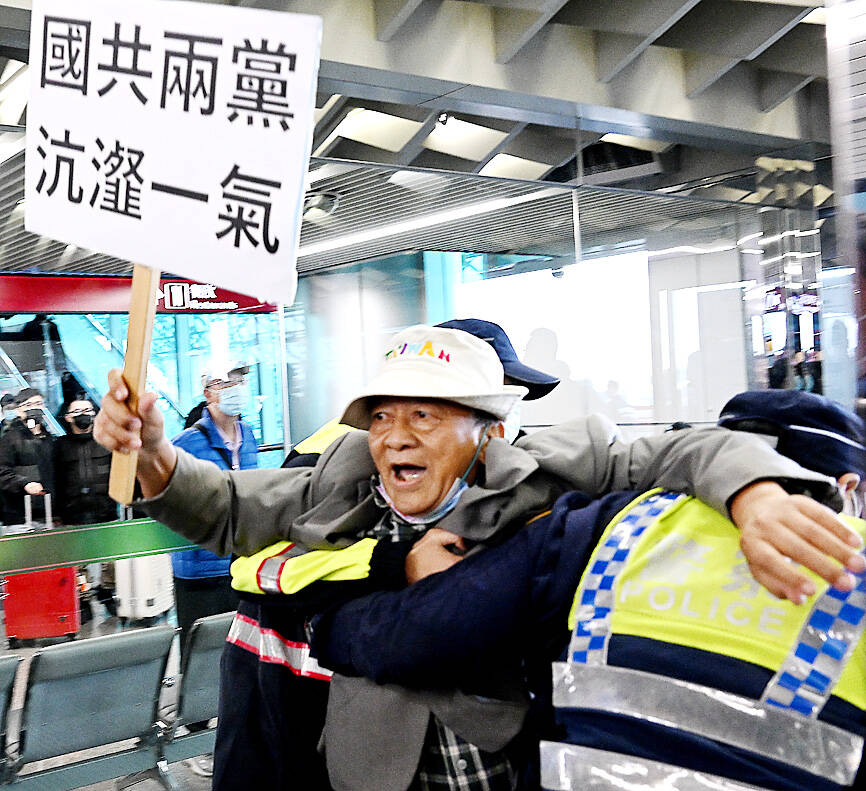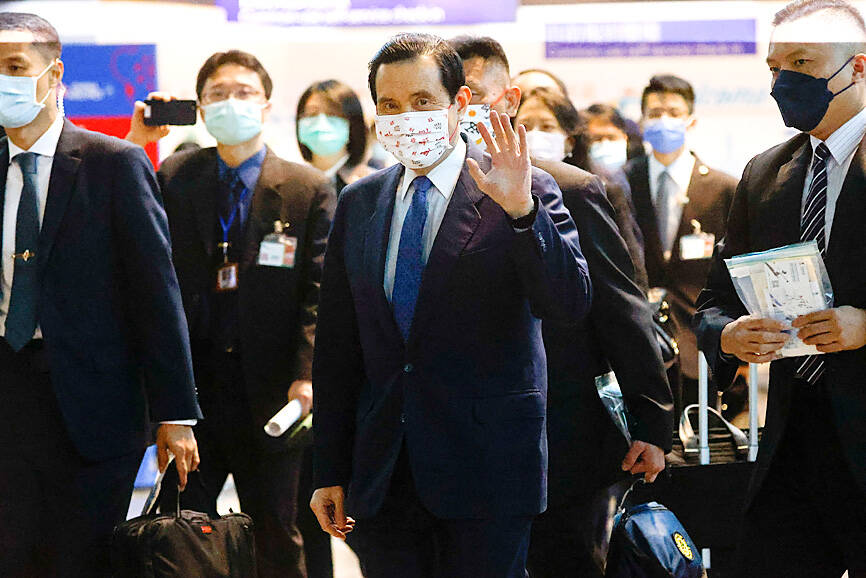Former president Ma Ying-jeou (馬英九) yesterday departed for a 12-day trip to China as scheduled, despite calls for him to cancel the trip after Honduras severed diplomatic ties with Taiwan as an apparent result of China’s dollar diplomacy.
“This is my first trip to China. I was 37 when I began handling cross-strait affairs in the government. Now I am 73 and have waited 36 years for the visit. It is indeed a bit too long, but I am glad I can go,” Ma of the Chinese Nationalist Party (KMT) told reporters at Taiwan Taoyuan International Airport.
“Aside from paying respects to my ancestors, I am taking a group of university students from Taiwan to have exchanges with Chinese university students, which I hope would help ease tensions across the Taiwan Strait and bring peace,” he said.

Photo: Hu Shun-hsiang, Taipei Times
Ma’s office last week said that the former president began planning the trip before the Lunar New Year holiday, but it has been perceived by some as a politically calculated move as President Tsai Ing-wen (蔡英文) is scheduled to depart for a 10-day trip tomorrow to visit two allies in Central America — Belize and Guatemala — via a stop in the US.
Taiwan Republic Office director Chilly Chen (陳峻涵) led a protest against Ma and his delegation at the airport yesterday, as they accused the former president of kowtowing to Beijing and selling out Taiwan.
“Right now many countries are supporting Taiwan and promoting more collaboration, but we see Ma and KMT members choose to stand with Beijing, and boost their links to the evil regimes of China and Russia,” Chen said. “Their action misleads the international community about a perceived close association with China.”

Photo: Ann Wang, Reuters
Democratic Progressive Party spokesman Chang Chih-hao (張志豪) last week said that Ma’s visit might send the wrong signal to the international community regarding China’s “aggressive, expansionist” behavior toward Taiwan.
Chang said that Ma’s trip would fall flat with the public, who would not accept seeing a former president “reduced to serving as a pawn in the Chinese Communist Party’s unification efforts.”
New Power Party (NPP) Legislator Chiu Hsien-chih (邱顯智) yesterday said that everyone would agree that the trip is a politically charged move, and that Ma should know this better than anyone.
“Ma was a Harvard University student when the US ended official ties with Taiwan in 1979. He said that he cried and protested after watching former US president Jimmy Carter make the announcement on TV, as he was uncertain what would happen to Taiwanese students studying in the US at the time,” Chiu said. “Forty-four years later, Ma did not shed any tears when Honduras severed ties with Taiwan because of China’s dollar diplomacy. Instead, he is going to China for his own political interest and to dance to Beijing’s tune.”
As the first former Taiwanese president to set foot in China, Ma should explain whether his office contacted Beijing after obtaining information about Tsai’s trip to Central America, or whether China obtained the information first and was trying to find a “partner” in Taiwan to execute its calculated move, Chiu said.
Additional reporting by Jason Pan

MAKING WAVES: China’s maritime militia could become a nontraditional threat in war, clogging up shipping lanes to prevent US or Japanese intervention, a report said About 1,900 Chinese ships flying flags of convenience and fishing vessels that participated in China’s military exercises around Taiwan last month and in January last year have been listed for monitoring, Coast Guard Administration (CGA) Deputy Director-General Hsieh Ching-chin (謝慶欽) said yesterday. Following amendments to the Commercial Port Act (商港法) and the Law of Ships (船舶法) last month, the CGA can designate possible berthing areas or deny ports of call for vessels suspected of loitering around areas where undersea cables can be accessed, Oceans Affairs Council Minister Kuan Bi-ling (管碧玲) said. The list of suspected ships, originally 300, had risen to about

DAREDEVIL: Honnold said it had always been a dream of his to climb Taipei 101, while a Netflix producer said the skyscraper was ‘a real icon of this country’ US climber Alex Honnold yesterday took on Taiwan’s tallest building, becoming the first person to scale Taipei 101 without a rope, harness or safety net. Hundreds of spectators gathered at the base of the 101-story skyscraper to watch Honnold, 40, embark on his daredevil feat, which was also broadcast live on Netflix. Dressed in a red T-shirt and yellow custom-made climbing shoes, Honnold swiftly moved up the southeast face of the glass and steel building. At one point, he stepped onto a platform midway up to wave down at fans and onlookers who were taking photos. People watching from inside

Japan’s strategic alliance with the US would collapse if Tokyo were to turn away from a conflict in Taiwan, Japanese Prime Minister Sanae Takaichi said yesterday, but distanced herself from previous comments that suggested a possible military response in such an event. Takaichi expressed her latest views on a nationally broadcast TV program late on Monday, where an opposition party leader criticized her for igniting tensions with China with the earlier remarks. Ties between Japan and China have sunk to the worst level in years after Takaichi said in November that a hypothetical Chinese attack on Taiwan could bring about a Japanese

The WHO ignored early COVID-19 warnings from Taiwan, US Deputy Secretary of Health and Human Services Jim O’Neill said on Friday, as part of justification for Washington withdrawing from the global health body. US Secretary of State Marco Rubio on Thursday said that the US was pulling out of the UN agency, as it failed to fulfill its responsibilities during the COVID-19 pandemic. The WHO “ignored early COVID warnings from Taiwan in 2019 by pretending Taiwan did not exist, O’Neill wrote on X on Friday, Taiwan time. “It ignored rigorous science and promoted lockdowns.” The US will “continue international coordination on infectious